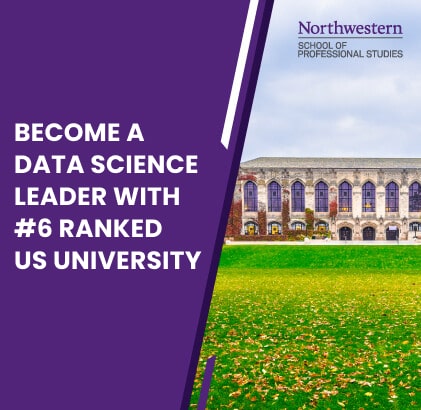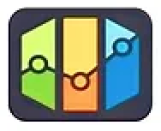MS in Data Science Programme from Northwestern University
Get the most elite Master’s degree from Northwestern University

Among US universities in 2025
*U.S. News & World Report 2025 Best College Rankings

Global University Rankings 2022
*The Times Higher Education World University Rankings 2022
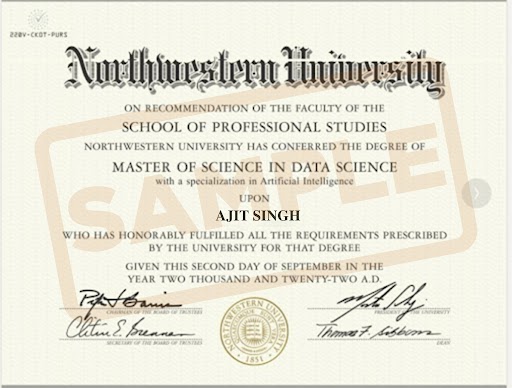
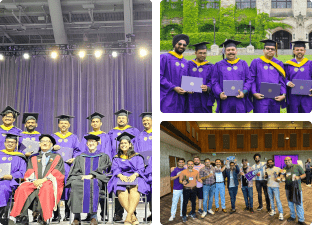
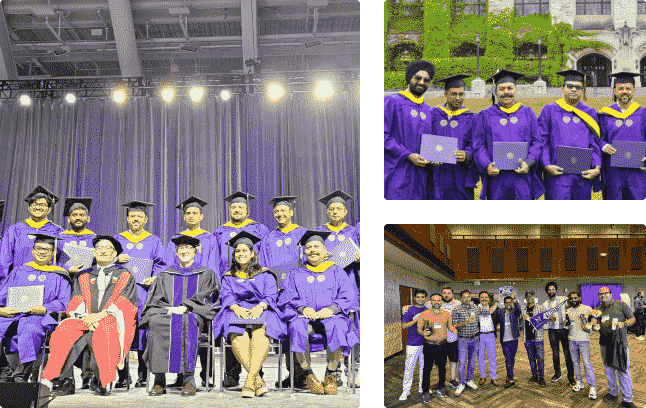
Curriculum
225+ hrs
Learning content
10+
Languages & Tools
- Apply linear programming methods to real-world models
- Analyze and interpret mathematical models
- Calculate and analyze derivatives and integrals of real-world models
- Evaluate and interpret probabilistic models
- Solve applications involving multivariate calculus
- Optimize outcomes modelled by graphs and trees
- Perform statistical analysis
- Interpret and evaluate statistical information
- Prepare technical reports
- Use the R programming language for data analysis
- Define key terms, concepts, and issues in data preparation and database management systems
- Discuss the nature of data: structured data vs. unstructured data, small data vs. big data, clean data vs. messy data
- Review and interpret Entity Relationship Diagrams (ERDs)
- Discuss the architectures and technologies for relational database systems, data warehousing, information retrieval, and search engines
- Use a high-level programming language for data extraction, preparation, and exploration
- Compare and contrast SQL and NoSQL databases, and demonstrate the ability to interact with both types
- Construct indexes for information retrieval
- Store and retrieve geospatial data and plot data on interactive maps
- Discuss standards for data mining and Business Process Modeling and Notation (BPMN).
- Explain concepts related to data mining, machine learning, and process mining.
- Use no-code/low-code platforms for predictive analytics and machine learning.
- Apply analytical and machine learning techniques for decision support.
- Identify data sources and requirements for business process analytics.
- Leverage no-code/low-code platforms for business process analytics.
- Implement business process analytics to address real-world business challenges.
- Analyze requirement specification documents for proposed projects or applications.
- Evaluate data sources and determine appropriate data exchange formats for specific projects or applications.
- Create comprehensive design documents based on analysis findings.
- Implement application designs following detailed design documentation.
- Deploy and test applications according to their implementation plans.
- Build and execute various programs and experiments using the Go programming language in a personal development environment.
- Conduct comparative analyses of results from programs and experiments developed in the Go language.
- Demonstrate skills and techniques in optimization, simulation, and decision analysis
- Select and recommend appropriate modeling techniques based on a business problem
- Formulate and develop decision-analytic solutions to a given business problem using software
- Present the results of decision-analytic solutions in both oral and written forms
- Demonstrate a comprehensive understanding of data management concepts, including data quality, integrity, usability, consistency, availability, and security.
- Propose effective methods for managing enterprise data provenance.
- Identify and address ethical, legal, and technical challenges in data management.
- Assess cybersecurity and network security risks and propose appropriate mitigation strategies.
- Compare and contrast data privacy and cybersecurity policies in the United States and the European Union.
- Design a data governance framework that incorporates best practices in data management.
- Apply an ML framework for model building
- Build and interpret regression models
- Build and interpret classification models
- Apply and interpret regularization and data reduction methods
- Build and interpret tree-based models for regression and classification
- Build and interpret unsupervised/semi-supervised learning models
- Build and interpret different types of neural network models
- Identify the role of natural language processing (NLP) and text analytics within the data sciences.
- Extract entities and concepts, and identify, characterize, and apply methods for entity and concept co-resolution.
- Select and apply clustering and classification algorithms, as well as other machine learning techniques, including supervised, unsupervised, and generative methods.
- Apply and evaluate methods for sentiment analysis and link analysis.
- Develop basic ontological schemas for interpretation during text analytics and use them to support context-dependent NLP.
- Use deep learning-based language models to perform common NLP tasks and improve performance.
- Identify key phases in the evolution of artificial intelligence (AI), including the emergence of deep learning.
- Distinguish between supervised, unsupervised, and reinforcement learning methodologies.
- Describe the structure and functionality of neural networks, including deep learning architectures.
- Apply neural networks and deep learning techniques to solve classification and regression problems, including supervised learning with backpropagation.
- Utilize probability-rule-based generative models in deep learning.
- Explain the importance of AI and deep learning techniques in real-world applications, such as computer vision and natural language processing.
- Determine the appropriate level of abstraction for applying computer vision to business problems.
- Build computer vision models from scratch using TensorFlow 2.0.
- Apply computer vision models to edge-based machine learning hardware, including Intel Movidius.
- Implement computer vision models on edge-based machine learning hardware integrated with managed ML systems using AWS DeepLens and AWS SageMaker.
- Utilize cloud-native computer vision APIs.
Term 1
MATH FOR DATA SCIENTISTS
Students will learn techniques for building and interpreting mathematical models of real-world phenomena across multiple disciplines, including linear algebra, discrete mathematics, probability, and calculus, emphasizing applications in Data Science and data engineering. This course provides students with a solid understanding or review of these fields of mathematics before enrolling in courses that assume knowledge of mathematical concepts.
LEARNING OUTCOMES
APPLIED STATISTICS WITH R
This course covers the fundamentals of statistical analysis, which form the foundation for all subsequent courses. Students will learn to evaluate statistical information, perform data analysis, and interpret and communicate analytical results. The course also teaches the use of the R programming language for statistical analysis, data visualization, and report generation. Topics include descriptive statistics, measures of central tendency, exploratory data analysis, probability theory, discrete and continuous distributions, statistical inference, correlation, multiple linear regression, contingency tables, and chi-square tests.
LEARNING OUTCOMES
Term 2
DATABASE SYSTEMS
LEARNING OUTCOMES
BUSINESS PROCESS ANALYTICS
LEARNING OUTCOMES
Term 3
FOUNDATIONS OF DATA ENGINEERING
LEARNING OUTCOMES
DECISION ANALYTICS
This course covers fundamental concepts, solution techniques, modeling approaches, and applications of decision analytics. It introduces commonly used methods of optimization, simulation, and decision analysis techniques for prescriptive analytics in business. Students will explore linear programming, network optimization, integer linear programming, goal programming, multi-objective optimization, non-linear programming, metaheuristic algorithms, stochastic simulation, queuing models, decision analysis, and Markov decision processes. Students will develop a contextual understanding of techniques useful for managerial decision support and will implement decision-analytic techniques using a state-of-the-art analytical modeling platform. This is a problem- and project-based course.
LEARNING OUTCOMES
Term 4
DATA GOVERNANCE, ETHICS, AND LAW
This course introduces key concepts in data management, including data quality, integrity, usability, consistency, availability, and security. It explores the lineage of data, also known as data provenance, and examines ethical, legal, and technical considerations related to data acquisition, dissemination, and privacy protection. The course also provides an overview of cybersecurity management, covering topics such as network, system, and database security, along with encryption and blockchain technologies. Additionally, it addresses laws protecting intellectual property, including discussions on copyrights, patents, and contracts.
LEARNING OUTCOMES
PRACTICAL MACHINE LEARNING
LEARNING OUTCOMES
Term 5
NATURAL LANGUAGE PROCESSING
This course provides a comprehensive review of text analytics and natural language processing (NLP), with a focus on recent developments in computational linguistics and machine learning. Students will work with unstructured and semi-structured text from online sources, document collections, and databases. Using methods from artificial intelligence and machine learning, they will learn how to parse text into numeric vectors and transform higher-dimensional vectors into lower-dimensional representations for analysis and modelling. Applications include speech recognition, semantic processing, text classification, relevant search, recommendation systems, sentiment analysis, and topic modelling. This is a project-based course with extensive programming assignments.
LEARNING OUTCOMES
ARTIFICIAL INTELLIGENCE AND DEEP LEARNING
This course offers an introduction to the field of artificial intelligence (AI), exploring probability-rule-based generative models and discriminative models that learn from training data. It examines the applications of AI and deep learning in fields such as computer vision and natural language processing. Students will learn best practices for building supervised learning models, including deep neural networks for classification and regression tasks. The course also covers feature engineering, autoencoders, unsupervised and semi-supervised learning strategies, and reinforcement learning. This is a project-based course with extensive programming assignments.
LEARNING OUTCOMES
Term 6
COMPUTER VISION
This course provides a comprehensive review of specialized deep learning methods for computer vision, including convolutional and recurrent neural networks. Students work with raw image data, such as digital photographs, handwritten documents, X-rays, and sensor images. The course emphasizes processing image data by converting pixels into numeric tensors for analysis and modelling. Real-world applications explored include visual exploration, image classification, facial recognition, remote sensing, and medical diagnostics. This is a project-based course with extensive programming assignments.
LEARNING OUTCOMES
CAPSTONE PROJECT
MS Degree from Northwestern University
Languages and Tools covered






and more..
Program Fees
Program Fees:
13,000 USD
Benefits of learning with us
- MS degree from Northwestern University
- Online, 100% Live sessions
- 18 months
- Hands-on learning with assignment and project work. Emphasis on learning by doing
- Fee payable in six quarterly instalments of $2,167 each
Frequently Asked Questions
The MS in Data Science is an 18-month program offered by the Northwestern University School of Professional Studies in collaboration with Great Learning. This program equips you to build key analytical and leadership skills required for careers in today's data-driven world. This program equips the learners with a comprehensive understanding of the most in-demand tools and technologies of the current world.
WES accreditation is only required for courses from universities outside of the US to prove that they are equivalent to one by an accredited US university.
For example, WES may look at a course by an Indian engineering college that assigns points out of 100 and then converts it to an equivalent score for a similar course in the US out of a 4.0 GPA scale.
As the MS in Data Science Programme is from Northwestern University, a US-accredited university, WES accreditation is not required.
While we highly encourage attendance at the sessions, we understand that scheduling conflicts may arise, which is why we will be uploading session recordings on the LMS (Learning Management System). This will allow students the flexibility to access and view the sessions at their convenience, even if they are unable to attend them live.
Yes, candidates from any part of the world can take up the MS in Data Science programme. As this course is offered completely online, you can enrol yourself and learn Data Science from the highly reputed faculty of Northwestern University.
-
Upon taking up the Masters in Data Science Programme offered by Northwestern University, you would learn the most in-demand tools and techniques of Data Science. Learners would gain a comprehensive understanding of all the concepts that are taught throughout the sessions.
-
Participate in the live interactive sessions delivered by the top faculty of Northwestern University.
-
You would work on several projects, and participate in quizzes and assignments that enhance your understanding. You would also work on a capstone project that incorporates all the tools and techniques learned throughout the course.
-
Taking up this course would also get you a Northwestern student email ID and provide membership to alumni clubs and exclusive Northwestern advantage.
-
You would also become a bonafide Northwestern alum.
-
You will also be provided with dedicated support to guide you throughout your learning journey.
-
Great Learning provides dedicated career support to its learners upon the successful completion of the course.
-
You would partake in several resume review sessions, 1:1 career guidance sessions, gain access to job boards and much more.
The curriculum of this programme encompasses all the fundamentals of Data Science. Throughout this course, you would learn about several concepts like Applied Statistics, Mathematics, Database Systems, Machine Learning, Data Governance, Python and more.
You will also complete coursework in Artificial Intelligence comprising Natural Language Processing, Artificial Intelligence, and Deep Learning
MS in Data Science programme from Northwestern University stands out with its remarkable benefits. The exclusive Northwestern advantage clubbed with the amazing benefits this course has to offer, makes this the right choice for professionals.
Here are a few of the benefits of the programme:
-
World-Class Faculty: Upon taking up the Masters in Data Science Programme by Great Learning, you would learn from the world-renowned faculty of Northwestern University. You will partake in the live interactive sessions with the faculty and enhance your understanding of concepts.
-
Hands-on Learning: Learners gain hands-on exposure to the tools and concepts learnt throughout the classroom sessions by participating in quizzes, assignments and projects. A capstone project is also assigned to the candidates at the end of the course that encompasses all the tools and concepts mastered during the live teaching sessions.
-
Comprehensive Curriculum: The curriculum of this programme is designed by highly skilled Data Science academicians and experts. The curriculum incorporates all the requisite tools and concepts employed in Data Science and Artificial Intelligence. Learners master several in-demand tools such as Python, R, SQL, Pandas and more.
-
MS Degree from Northwestern University: Upon the successful completion of this course, learners obtain a certification from the prestigious Northwestern University that adds value to their resumes.
Besides the above mentioned, there are a lot more benefits that this course offers. Do check out the fee, syllabus and more.
The duration of a Data Science Master’s Degree from Northwestern University is 18 months, 6 terms of 3 months each.
While knowledge of a programming language is not a prerequisite, the course will extensively use Python and R programming languages for the demonstration of concepts as well as for project work. If applicants do not have any background in programming then it would be helpful if they started learning Python and R prior to the start of the course.
While in terms of curriculum design and academic & career outcomes, this online degree is the same as a classroom programme, the key difference comes in how the curriculum is delivered. Classroom-based learning relies on more in-person interactions where students attend lectures in a classroom, interact with faculty over office hours, have study sessions with TAs, etc. In an online programme all this interaction shifts so that it happens over the internet. This shift allows for greater convenience, flexibility, and adherence to social distancing measures, making online programs an attractive option. Thus an online programme offers more convenience, flexibility, and safety (by providing social distancing) compared to a classroom programme
This is a master level degree and will be rigorous in nature. While the time needed will vary depending on prior knowledge, students should plan to spend around 15 - 20 hours every week.
All faculty will decide on the grading mechanism of their respective subjects. The evaluation criteria will be shared by them at the start of every course.
The programme follows a cohort-based approach and students would be required to complete the various courses in a prescribed order.
The exact number of sessions will be determined by the respective faculty, although, each course will feature a minimum of three engaging live sessions.
The typical duration of a live session would be 2.5 hours.
There will be a mix of live sessions as well as pre-recorded video lectures. Live sessions will also get recorded, in case a student is unable to attend a session or wishes to review it they would be able to view the recording again.
- Flexibility: This programme encompasses online learning with live sessions. The live sessions of this programme are organised to cause minimal disruptions to your personal and professional lives.
- Committed Student Support: Learners are empowered with constant support from several industry experts that help them in every step of their learning journey.
- Career Assistance: Great Learning provides outstanding placement opportunities to their learners upon the successful completion of this course. Each learner is provided with comprehensive career services that assist them to land their desired job roles.
- Learn the most in-demand tools: Upon taking up this programme, learners gain an understanding of the most in-demand tools such as R, Python, TensorFlow and more.
There is no predefined list of questions that an applicant needs to answer. The SOP is meant more as a way for the admissions team to better understand an applicant and their background. Some of the points which an applicant can cover to achieve this are:
- What is your motivation to enroll in a master’s degree?
- How will this degree help you achieve your career goals?
- How are you well positioned to leverage this degree in order to grow your career?
Applying early will not confer any special advantage however, the faster you apply the earlier you stand to get a decision. Some steps in the application process will need time and the admissions team themselves thoroughly evaluate each application so we advise that students submit an application as early as possible to avoid missing the deadline or having to rush at the last minute.
We have multiple cohorts starting every year, please connect with your admissions counsellor to know more.
Applicants can get in touch with their Admissions Counselors for guidance on how to complete the transcript evaluation process. Applicants may also submit their transcripts directly to an evaluation agency accredited by the National Association of Credential Evaluation Services (NACES).
Please contact an admissions counsellor to review the process for submitting mark sheets for initial evaluation.
Applicants will be required to submit scanned copies of their mark sheets or their official transcripts, and a copy of their degree certificate.
Students should have completed a 4 year U.S. bachelor’s degree or equivalent.
(For students who did not complete their degree in the U.S.): If your transcript evaluation states that your degree is equivalent to a 4 year U.S. bachelor degree then you can apply for this programme.
(If the student completed their bachelor degree in the U.S.): If you have a 4 year bachelor’s degree then you can apply.
No.
If the medium of instruction for the student’s bachelor degree was English (as certified in the transcript evaluation report) then no. If your transcript is being evaluated by a NACES member agency , please ask them to clearly indicate this in their report.
If the medium of instruction was not English then the student would need to give an English language proficiency test like IELTS or TOEFL.
While knowledge of mathematics and statistics will be useful, it is not a prerequisite. Being a master’s program, the individual subjects themselves will have significant quantitative components and potential students are advised to brush up on their mathematics if they have not had the opportunity to use it recently.
While the course is designed to be convenient for working professionals, any student who fulfills the eligibility criteria can do this degree programme.
While there are no scholarships, enrolling students have the flexibility to pay the fees in installment. We also have tie up with financial institutions to provide education loans.
At this point, there is no discount or other financial aid available.
The tuition for this degree is $13,000. This can be paid in 6 equal instalments of $2,167 each (payable at the start of every term). Please note that apart from the tuition, students will also need to budget for the following expenses:
-
A fee of $35 each for online proctored examinations (3 in total)
-
The cost of travelling, boarding/lodging and other expenses for the residency sessions (approximately $500 per residency) will have to be borne by the students.
The application of the most in-demand technology of Data Science in formulating effective business strategy has generated huge demand for professionals that can make data-driven decisions to promote business growth.
Hence, Great Learning in collaboration with Northwestern University has designed a perfectly curated programme for professionals seeking to pursue an MS in Data Science to assist organisations in making critical data-driven decisions.
Below are the learning outcomes that learners can expect upon taking up this programme:
-
Effective analytics as a central strategy of Data Science.
-
Convert data into meaningful insights.
-
Generate statistically sound and sturdy analytical solutions.
-
Build leadership, define and execute plans to address business problems.
-
Assess risks and limitations on the application of data.
-
Evaluate data structure and data lifecycle.
Becoming a Northwestern Alumni offers some excellent benefits:
-
Learners gain access to global alumni events.
-
Learners gain access to free learning events, library resources and much more.
-
Learners also gain access to Northwestern University's email address.
-
Learners also get to join a community of award winners and thought leaders in several domains such as Science, Technology, Politics, Arts & Entertainment and more.
The two-day residencies are distinct, in-person interactions that augment the online Masters in Data Science programme on Great Lakes Chennai or Gurgaon campuses.
Residencies provide an excellent platform to acquire knowledge, build connections, and interact with fellow students and professors in an environment reminiscent of a traditional campus. In these residencies, learners collaborate in person with their team members on mandatory coursework and showcase their projects. Attendees get an opportunity to understand varied strategies for addressing data science challenges by observing the work of others. You can also look forward to several career-enhancing activities throughout both residencies.
Northwestern's Master's in Data Science Programme distinguishes itself as the only online programme that includes an in-person element - two residencies that take place in India during the 4th and 6th terms of the programme.
The practical Machine Learning module is divided into “a” and “b” parts. Practical Machine Learning (a) contributes .5 course credits to your degree progress and involves the actual in-course components of the curriculum.
The Practical Machine Learning (b) provides the remaining .5 credits towards your degree progress and comprises the compulsory residency component of the curriculum. For credit towards their degree, students must attend the residency in person at the Chennai or Gurgaon campuses.
Likewise, the Capstone module is divided into "a" and "b" parts, with .5 credits accumulated through class participation, and the last .5 credits are obtained by attending the second mandatory on-site residency.
-
Networking Opportunities: Residencies offer the chance to solidify relationships with highly capable professionals that you have already been introduced to in an online environment through the course of the programme. The inviting atmosphere of the campuses makes it easy to connect with your fellow students during meals, refreshments, and various engaging activities. Given that all participants will spend at least one, and sometimes two, nights on campus, this residential environment promotes bonding among the cohort.
-
High-Quality Educational Experience: Both Northwestern University and Great Learning are committed to providing a top-notch educational experience, which forms a crucial element of this MS in Data Science programme. Interaction with faculty through structured lectures and less formal social gatherings is encouraged. Each cohort's experience will differ, but participants can anticipate joining in on academic events like Kaggle competitions and comprehensive Capstone presentations and review sessions. Prestigious industry professionals will lead discussions on practical applications of data science across diverse industry topics, guaranteeing that participants acquire knowledge that is applicable in real-world scenarios and goes beyond theoretical classroom learning.
-
Career Guidance: Robust career support for those who aspire to change their professional path, as well as those who wish to advance in their current roles, is offered. Within the residency, group sessions guide learners on how to fast-track their careers in data science. Personalized mentoring sessions with experienced industry professionals, allowing learners to delve deeper into their short and long-term career goals, are also a part of the offering.
The cost for each residency is approximately $500*, which is directly paid to Great Learning. This payment includes the following:
-
Comfortable single-occupancy accommodation for 1-2 nights at the Great Lakes Institute of Management campuses in Chennai or Gurgaon
-
Three meals per day, along with coffee, tea, and light refreshments
-
A grand networking dinner gala featuring a variety of food and drinks
-
Access to campus amenities such as the gym, tennis courts, and pool table, among others
-
Remuneration for the experts and mentors for their valuable time
*Please note these costs do not account for personal travel expenses to the Great Lakes campuses.
In collaboration with

The Northwestern University is collaborating with Great Learning to deliver the Post Graduate Program in User Experience. Great Learning is an ed-tech company that has empowered learners from over 170+ countries in achieving positive outcomes for their career growth.
Master’s in Data Science Programme from Northwestern University School of Professional Studies
Numerous programmes are available across the globe to offer a Master’s Degree in Data Science. Nevertheless, working professionals have several reasons to register in this MS in Data Science programme from Northwestern University, collaborating with Great Learning. Check out the reasons drafted below:
-
Northwestern University is ranked as one of the world's highest-ranked institutions.
-
According to the U.S. News and World Report 2022 Best College Rankings, Northwestern University is ranked #9 globally. According to the Times Higher Education (THE) World University Rankings 2022, Northwestern University is ranked #24 globally.
-
Northwestern University School of Professional Studies is one of the 12 official schools and colleges affiliated with Northwestern University, providing a world-class education to students whose academic pursuits need to be balanced with professional and personal commitments.
Benefits of Pursuing the MS in Data Science Online Programme from Northwestern University
-
Pursue the online Data Science Master’s course and learn cutting-edge tools and techniques from seasoned, industry-relevant faculty members.
-
Join the distinguished community of faculty and alumni, recipients of the Nobel Prize, MacArthur Genius Grant, Pulitzer Prize, Grammy Award, Academy Award, Emmy Award, Tony Award, and Guggenheim Fellowship, among several other honorary and professional accolades.
-
Pursue the course online with live sessions and part-time learning mode, and learn popular programming languages, frameworks, and libraries in a hands-on environment.
-
Obtain comprehensive career services, like 1:1 career mentorship, placement process, and more.
Northwestern Alumni Benefits
Becoming a Northwestern Alumni comes with excellent benefits —
-
You can acquire lifelong membership, from global alumni events to free learning events, library resources, and a Northwestern email address.
-
You will also be affiliated with a community of award-winners and world leaders in science, technology, arts, politics, and entertainment, including the likes of Stephen Colbert, George R.R. Martin, Virginia Rometty, Rahm Emanuel, and others.
Details about MS in Data Science Online Course
In this comprehensive MS in Data Science online course, the students will grasp all the essential skills required to master the Data Science field. Let’s go through in-depth details about the programme:
MSc Data Science Learnings:
-
The integration of Data Science and Business Analytics has created a demand for professionals who can make data-driven decisions that propel their organizations forward.
-
You will build the critical data analysis and leadership skills necessary for careers in today's data-driven world.
-
You will articulate analytics as a core strategy of Data Science and develop statistically sound and robust analytic solutions.
-
You will be able to transform data into actionable insights.
-
You will be able to demonstrate leadership and formulate and manage plans to address business issues.
-
You will evaluate constraints on the use of data and assess data structure and data lifecycle.
MSc Data Science Syllabus:
-
It commences with the fundamentals, such as Mathematics and Statistics for Data Science, R and Python Programming.
-
Later, students will learn Machine Learning techniques, including Supervised and Unsupervised Learning algorithms, Database Systems and Data Preparation, Data Governance, and Decision Analytics.
-
Lastly, students will learn Artificial Intelligence, Deep Learning, Natural Language Processing, and Computer Vision.
-
Upon completion of learning Data Science, students will implement a Capstone Project.
[Explore MSc in Data Science Syllabus]
MSc Data Science Eligibility:
-
Students must have completed a 4 year U.S. Bachelor’s degree or equivalent.
-
Students with a 3 year Bachelor’s Degree, which is equivalent to a 4 year U.S. Bachelor’s degree, are also eligible to enroll in this programme. Please contact an admissions counselor for further information.
Master’s in Data Science Course Duration
This Master’s course is for 18 months with online live sessions from world-renowned faculty members from Northwestern University.
MS in Data Science Programme Fees
This MS programme costs USD 13,000, which the students can pay through 6 quarterly installments of USD 2,167 each.
Secure an Online Master’s Degree in Data Science from Northwestern University
After successfully completing this course, you will secure an MS Degree in Data Science from Northwestern University.

